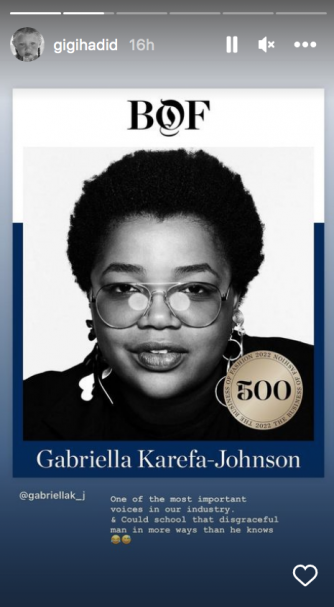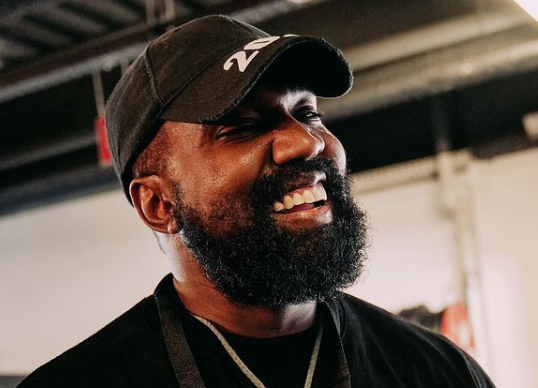Kanye West being controversial is not news.
It’s something the public has long been fascinated by, and has never really known what to do with.
Most of Mr West’s antics, stunts, expressions (whatever your take) have worn both praise and criticism suits. The public has historically battled each other for a general consensus on many of West’s moves; a duality that’s kept West on top of relevancy.
The conversation surrounding his expressions almost includes mentions of art, creative freedom and even “genius” when it comes to Mr West, and in the same breath “crazy”, ridiculous, and unnecessary. Maybe all of the above held truth at different points, or the same points. However, the real crux of the matter making headlines today is as follows:
What is an artist who can’t take criticism?
Most don’t challenge the likes of Ye in a way that would send the artist to spiral into nothing short of bullying. That was until one Vogue contributing editor, Gabriella Karefa-Johnson did.
It all began on 3 October when Karefa-Johnson made a criticism that would have people say “Kanye’s gone too far this time.”
View this post on Instagram
West strutted ‘White Lives Matter’ T-shirts down the YZY29 runway, something that caused enough controversy without his attack on Karefa-Johnson.
Some might wonder why a T-shirt playing on the Black Lives Matter movement mattered. Don’t white lives matter?
That’s not what the shirts were trying to say. What they did was take away from a movement that never claimed a non-black person’s life couldn’t matter too. What they did, was readjust a conversation to a deeper part of American culture and history, not unlike West’s Confederate flag-patched jacket, or Trumpian ‘Make America Great Again’ campaigns.
In those instances, West positioned his choices as taking back power. As it often is with West, these decisions of expression don’t work the same way they do for the average person. They have insurmountable influence to an audience that won’t read between the lines of creativity, if those lines exist.
If it were a feminist think tank, it would be saying that ‘men deserve equal rights’ in a place like Iran. They do deserve equal rights, no one said they didn’t. The fallacy though in misunderstanding feminism, especially in historically oppressive societies as it is with BLM, is that the focus has to be readjusted to the demographic that needs more awareness and support.
Raven Smith sums it up perfectly:
“For me, they’re empowering right-wing ideology, further enabling its airtime when we should be stamping it out.
“Objectively, white lives do matter, but Black Lives Matter was not, as a movement, a commentary on the value of a non-Black person’s life. Those three words came to symbolize many facets of the Black experience, but the movement was, at its essence, focused on Black mortality rates being higher, especially when black lives come into contact with law enforcement. Black Lives Matter was never anti-white but advocating for racial parity, concentrating on criminal justice reform. ”
Some were in favour of West’s T-shirts, expressing that they exposed the Black Lives Matter as a stunt in itself – holding as much weight as a WLM slogan in a society that already serves the white American.
This could’ve been West’s take, and it’s likely that it was. Still, the bigger conversation isn’t about unexplained rationales. It’s about the entire context of West’s relationship with influence.
The critic
Gabriella Karefa-Johnson, a Vogue contributing editor shared stories of her perspective on the T-shirts which she saw live.
“There is no excuse, there is no art here. I do think if you asked Kanye, he’d say there was art, and revolution… There isn’t,” she shared.
“I guess I get what he tried to do– he thought it was duchampian. It wasn’t,” she shared later on.
It’s likely that she never expected West to see the stories, let alone respond. However, he did and decided to publicly call her out in a since-deleted post; going as far as to mock her fashion choices in another upload to millions of followers.
As we’ve seen with other West-led bullying sagas, the impacts on mental wellbeing and public scrutiny can be detrimental.
Since the posts, numerous high-profile people have taken to stand up to West, including supermodel Gigi Hadid who shared that Karefa-Johnson is “one of the most important voices in [the fashion] industry.”

Others who took to disagree with the bullying included former YEEZY GAP design director Mowalola in a text; which West also shared on Instagram.
Eventually, West’s apology did come, in all caps and with confused undertones.
The apology almost alluded to the whole thing being a PR stunt by Vogue to “speak on {West’s] expression” that set to pin black creatives against each other, from Ye’s perspective.
It took jabs as it attempted to “make peace” which left most of West’s followers not entirely sure what to make of the matter.
View this post on Instagram
Fashion isn’t political? I think that this latest run has proven if anything, that it has never been more political than now.
ALSO SEE:
Feature Image: @331des/Instagram

